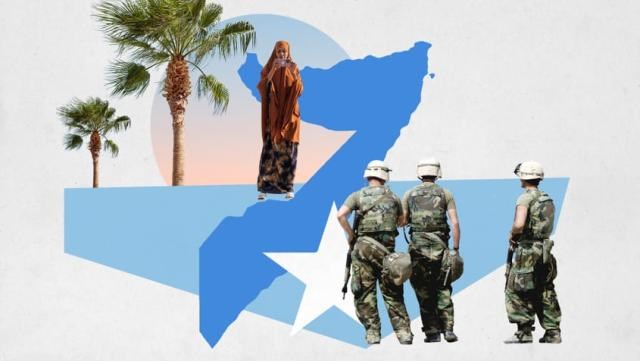
Friday March 24, 2023
By Justin Klawans

An illustrated collage of U.S. troops, Somalia's outline, and palm trees Illustrated/Getty Images
President Biden may have ended the "forever war" in Afghanistan in 2021, but an American conflict still rages on in Somalia, one of the last bastions of the United States' decades-long war on terror. Here's everything you need to know:
Why are American troops in Somalia?
American troops are mainly in the country to fight the terrorist group al-Shabaab, which bases itself in Somalia and other portions of East Africa. While the combat in Somalia is not often talked about, there has actually been an on-and-off American presence in the country since at least 2007, as part of a post-Sept. 11 authorization for military activity against terrorists.
American operations were previously extended in Somalia by former Presidents Barack Obama and Donald Trump during their respective time in office. While Trump had withdrawn most troops from the nation in the final weeks of his presidency, the White House announced in May 2022 that it was re-establishing a permanent military zone in Somalia to fight al-Shabaab. This comes despite the fact that Biden had pledged to end the "forever wars" against terrorism that have been ongoing for years.
White House press secretary Karine Jean-Pierre said that Biden approved the request for additional troops to "enable a more effective fight against al-Shabaab, which has increased in strength and poses a heightened threat." She described the terrorist group as "al-Qaeda's largest and wealthiest global affiliate, and one that holds substantial territorial safe haven."
However, the presence in Somalia is not large, as Biden re-authorized just 500 troops in the country on a permanent basis. This is even less than the 750 full-time soldiers who were in Somalia under the Trump administration. The Biden administration also said the troops were not being sent to engage in direct combat, but to provide security and services for Somali officials and counterterrorists.
What is al-Shabaab?
Considered a terrorist organization by international groups and Western countries, al-Shabaab "is a Salafi-jihadist insurgent group based in Somalia," Task and Purpose writes, and "previously controlled the capital of Mogadishu but now holds roughly a fifth of the country under its control." In addition to its base in Somalia, there is also an al-Shabaab presence in Kenya and Ethiopia.
Al-Shabaab emerged out of decades of in-fighting and instability within Somalia, and incubated within a militant group in the mid-1990s, according to the Council on Foreign Relations. Since its beginnings, the group has had indelible links to the terrorist group al-Qaeda and Osama bin Laden, and the CFR notes that "al-Shabaab's leadership declared allegiance to al-Qaeda in 2012," and has consistently sought more cooperation from the group.
Al-Shabaab generates income using several nefarious methods, the CFR adds, including "other terrorist groups; piracy; kidnapping; and extortion of local businesses, farmers, and aid groups, among others."
The group is known for being extremely violent, and "has claimed responsibility for many bombings — including various types of suicide attacks — in Mogadishu and in central and northern Somalia, typically targeting Somali government officials," the Office of the U.S. Director of National Intelligence writes. This includes a 2017 truck bombing in Mogadishu that killed almost 600 people. It has additionally been reported by The Associated Press that al-Shabaab has killed at least a dozen Americans in Somalia.
Despite this, some security experts feel that the threat from al-Shabaab isn't as dire as the United States makes it seem. The threat to U.S. interests from the group could even be considered "extremely attenuated and possibly nonexistent," Katherine Ebright of the Brennan Center for Justice tells Vox.
How long will troops stay in Somalia?
It is unclear exactly how long the military operation could last, as no specific timetable was provided. However, it could be for the long run, as the U.S. government, unlike some security experts, seem to feel that the threat from al-Shabaab is real and pervasive.
Officials note that the American military has "long believed that al-Shabaab has the intent to attack the United States, though it lacks the capabilities to do so currently," Foreign Policy writes, adding that the Defense Department considers the group "both the fastest-growing and most kinetically active terrorist cell on the continent."
There is also evidence that the American presence in Somalia prior to Trump's withdrawal was helping to stop al-Shabaab. In the year following the U.S. pullout, BBC News reports that "the number of al-Shabab attacks rose from 1,771 to 2,072," an increase of 17 percent. Given that the American counterterrorism efforts were clearly effective in dampening the group's efforts, there could be a military presence in the country for a while.
What has the response been?
At the time of Biden's authorization, many people in Mogadishu were cautiously optimistic about the American re-intervention.
The increased presence by the U.S. "will help Somalia maintain security," Osman Moallim, chairman of Somali Non-State Actors, told The Washington Post, though he added that "military is not the only solution." Somali President Hassan Sheikh Mohamud thanked Biden for his support, calling the United States "a reliable partner in our quest to stability and fight against terrorism."
Others, however, have urged the international community to focus on the narratives of instability within Somalia. Al-Shabaab's ability to exploit its own people "is a symptom of political dysfunction in Somalia," Omar Mahmood, a senior Somalia analyst at the International Crisis Group, tells Time. Mahmood adds that "only calling [al-Shabaab] a terrorist actor and confining them to military action is not really appropriate. There needs to be some sort of political track, some sort of outreach track from the U.S. as well."